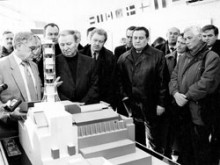There is enough food for thought; shutting down three power units in Chornobyl and the social protection program for the residents of Slavutych will require $1.5 billion in 15 years. Another $768 million is needed to carry out the SIP Plan, converting the Shelter into an ecologically safe system.
On February 22 President Kuchma signed a directive appointing Oleh Dubyna head of a task force to solve the problem of Chornobyl and Slavutych.
At a conference with Chornobyl officials on February 20, Pres. Kuchma said that the interministerial committee to solve the problems of Chornobyl, nuclear personnel, and Slavutych residents, presided over by Viktor Yushchenko, “must work and take responsibility.” He further criticized the committee’s performance, stressing that he felt “ashamed for those in power” who were, in his opinion, taking their time solving the social problems facing the residents of Slavutych and station personnel. He reminded those present that, when closing down the Chornobyl station, he had given the people his word that “the state will not leave them to face with their problems alone.” He further noted that the current trip to the station was on the National Security and Defense Council’s initiative. NSDC Secretary Yevhen Marchuk addressed the conference, stressing that after Oleh Dubyna’s task force had been set up “monthly written progress reports” began to be submitted, analyses completed, and suggested that the cabinet be instructed to consider the progress made under the Chornobyl- Slavutych social relief program in its extraordinary sitting (in Slavutych, the anticipated unemployment rate is 24%), and bring to account those responsible for leaving the existing problems unsolved. The conference dealt with yet another pressing problem: completion of the power units at the Khmelnytsky and Rivne facilities. Fuel and Energy Minister Serhiy Yermilov announced that the cabinet had received a letter from the EBRD on February 19. It read that the board meeting has been postponed to March, due to the IMF being undecided on resuming the EFF program. In that case, Leonid Kuchma announced, Ukraine must finish construction using its own resources. “Why are we walking around with outstretched hands and they keep slapping our hand with all kinds of conditions? Didn’t we know that it would be like this when we closed the Chornobyl NPP?” he asked and then answered. “We did. The inference could be made when we rejected nuclear weapons.”
Later, when asked whether Ukraine needs EBRD credits to finish the construction of the compensatory generating capacities, the Ukrainian President stressed, “We must have those credits by all means.” Simultaneously, he recalled that such credits have been under discussion since December 1995. “We haven’t received anything in five years, and we had to activate compensatory capacity before closing down Chornobyl, so any sober-minded person will wonder whether they intend to give them [loans] to us at all.” He added that he was wondering now if Ukraine should wait for those credits.
Leonid Kuchma also noted that the Khmelnytsky and Rivne compensatory capacities must be “completed whatever the weather,” although Ukraine is constantly confronted with “additional conditions” from international financial institutions. “I regard this (the new conditions — Ed.) as a reluctance to provide credit for the completion of these units.” The reader should be reminded that Ukrainian experts estimate the total cost of completion at $500-600 million, while Western participation, insurance, interest on the credits, and consulting costs increase the sum to $1.5 billion.
The president’s attention to the nuclear power industry, of course, testifies to the presence of numerous problems in it, and the industry is of vital importance for national security. This is also evidence of the government’s passive (to put it mildly) approach. Suffice it to mention the paradoxical situation with the Enerhoatom National Energy Company. For the time being, it has two presidents, one appointed by the President’s edict and the other awaiting the Premier’s instructions. The Premier might be trying in this way to bargain for something he himself needs. But is this bargaining proper under the circumstances?







